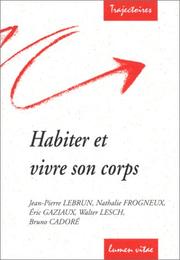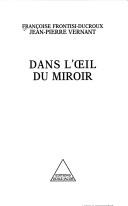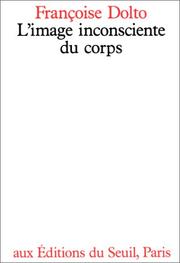| Listing 1 - 8 of 8 |
Sort by
|

ISBN: 2873241721 9782873241728 Year: 2002 Volume: 13 Publisher: Bruxelles Lumen Vitae
Abstract | Keywords | Export | Availability | Bookmark
 Loading...
Loading...Choose an application
- Reference Manager
- EndNote
- RefWorks (Direct export to RefWorks)
Adulé ou méprisé, magnifié ou suspecté, le corps soulève bien des passions et laisse rarement indifférent. À la fois vulnérable et puissant, déchu et glorifié, quand il veut se dire il suscite les paradoxes. Lieu des enjeux médicaux; culturels et éthiques importants, il est devenu le centre vers lequel convergent les, grandes problématiques contemporaines. Face aux transformations qui l'affectent, qui nous touchent au plus intime de nous-mêmes et qui remettent en jeu notre identité, comment penser, habiter et vivre son corps ? Que signifie encore avoir et être un corps ?
Anthropologie --- Antropologie --- Ethique médicale --- Medische ethiek --- Psychanalyse --- Psychoanalyse --- Body, Human --- Bioethics --- Human Body --- Anthropology --- Philosophy --- Christianity --- Bioéthique --- Corps humain --- Human body (Philosophy) --- Human body --- Religious aspects --- Christianity. --- Aspect moral. --- Social aspects --- Moral and ethical aspects --- 241.64*1 --- -Body, Human --- Human beings --- Body image --- Human anatomy --- Human physiology --- Mind and body --- Theologische ethiek: seksuele antropologie --- -Catholic Church --- -Theologische ethiek: seksuele antropologie --- 241.64*1 Theologische ethiek: seksuele antropologie --- -241.64*1 Theologische ethiek: seksuele antropologie --- Body, Human - Religious aspects - Christianity --- Bioethics - Religious aspects - Christianity --- Corps humain - Aspect moral. --- Human body (Philosophy) - Congresses --- Human body - Social aspects - Congresses --- Human body - Moral and ethical aspects - Congresses --- Moraal --- Theologie
Book
ISBN: 9782204102131 220410213X Year: 2014 Publisher: Paris Éditions du Cerf
Abstract | Keywords | Export | Availability | Bookmark
 Loading...
Loading...Choose an application
- Reference Manager
- EndNote
- RefWorks (Direct export to RefWorks)
Une bombe à retardement : c'est ainsi que l'on peut qualifier les catéchèses de Jean-Paul II sur la théologie du corps. Grâce à cette édition sans précédent, ces réflexions détoneront de nouveau. Les audiences générales qu'il donna entre 1979 et 1984 dispensaient le plus vaste enseignement jamais délivré par un pape sur un tel sujet dans toute l'histoire de l'Eglise. En plus d'une traduction entièrement révisée, cette édition est augmentée d'une introduction permettant d'apprécier l'importance de cette doctrine novatrice, du plan établi par Jean-Paul II dans son manuscrit rédigé en polonais avant son élection - ignoré jusqu'à sa mort -, et d'un texte inédit, retrouvé dans les archives de l'archevêché de Cracovie, rédigé en français, le "mémorandum de Cracovie". Cette méditation révèle une pensée audacieuse mais profondément fidèle à l'esprit du christianisme, qui place au plus intime de nos vies la démesure de l'amour divin, et prouve s'il en était besoin que l'Eglise offre autre chose qu'une morale rigoriste et dépassée.
Love --- Human body --- Theological anthropology --- Amour --- Corps humain --- Anthropologie théologique --- Religious aspects --- Catholic Church --- Aspect religieux --- Eglise catholique --- #GGSB: Moraal - Algemeen --- #GGSB: Seksuele ethiek --- #GGSB: Seksualiteit --- Anthropologie théologique --- Catholic Church. --- Moraal - Algemeen --- Seksuele ethiek --- Seksualiteit
Book
ISBN: 2830906810 Year: 1992 Publisher: Genève Labor et Fides
Abstract | Keywords | Export | Availability | Bookmark
 Loading...
Loading...Choose an application
- Reference Manager
- EndNote
- RefWorks (Direct export to RefWorks)
#GGSB: Dogmatiek --- #GGSB: Schepping --- GGSB: Dogmatiek. --- GGSB: Schepping. --- Future life --- Human body --- Incarnation --- Resurrection --- Spirit --- Pneuma --- Pneumatology (Philosophy) --- Pneumatology (Theology) --- Holy Spirit --- Soul --- Kenosis (Theology) --- Body, Human --- Human beings --- Body image --- Human anatomy --- Human physiology --- Mind and body --- Christianity --- Religious aspects&delete& --- Dogmatiek --- Schepping --- Religious aspects
Book
ISBN: 9028908528 Year: 1983 Publisher: Antwerpen De Nederlandsche Boekhandel
Abstract | Keywords | Export | Availability | Bookmark
 Loading...
Loading...Choose an application
- Reference Manager
- EndNote
- RefWorks (Direct export to RefWorks)
Filosofie --- Philosophie --- bio-energetica --- gevoelens --- lichaam --- 159.93 --- Mind and body --- Sensory stimulation --- #gsdbP --- #GBIB:SMM --- #GGSB: Seksuele ethiek --- 415.2 )* ZINTUIGLIJKE INDRUKKEN --- SMV:België --- SMV:Nederland --- SMV:filosofie --- Perception --- Senses and sensation --- Sensory deprivation --- Body and mind --- Body and soul (Philosophy) --- Human body --- Mind --- Mind-body connection --- Mind-body relations --- Mind-cure --- Somatopsychics --- Brain --- Dualism --- Philosophical anthropology --- Holistic medicine --- Mental healing --- Parousia (Philosophy) --- Phrenology --- Psychophysiology --- Self --- 615.88 --- 159.94 --- 61 --- Zintuiglijke waarnemingen --- Psychological aspects --- Mind and body. --- Sensory stimulation. --- 159.93 Zintuiglijke waarnemingen --- Seksuele ethiek --- Sociology of the family. Sociology of sexuality

ISBN: 2738104975 2738104533 9782738104977 Year: 1997 Publisher: Paris Jacob
Abstract | Keywords | Export | Availability | Bookmark
 Loading...
Loading...Choose an application
- Reference Manager
- EndNote
- RefWorks (Direct export to RefWorks)
L'embryon a-t-il une âme? Si oui, cette animation est-elle immédiate, dès la conception, ou bien différée? Et, dans ce cas, quand et comment se produit-elle? Cette question a de tout temps été objet de controverses. Les grandes religions monothéistes y apportent des réponses différentes. La science elle-même a longtemps balbutié avant, de comprendre les mécanismes intimes de la reproduction. À l'aube du XXIe siècle, les progrès de la biologie moléculaire renouvellent le débat. Médecin, spécialiste du traitement de la stérilité et des grossesses pathologiques, c'est d'abord en praticien quotidiennement confronté aux interrogations des patients que je m'exprime ici. La médecine, lorsqu'elle touche à la question des origines de l'être, doit tenir compte des progrès scientifiques mais également des questionnements éthiques et du sens à donner à nos décisions thérapeutiques. Le statut de l'embryon peut-il varier selon le regard qu'on lui porte?
Social perception --- Human body --- Women --- Perception sociale --- Corps humain --- Femmes --- History --- Histoire --- Greece --- Grèce --- Civilization --- Social life and customs --- Civilisation --- Moeurs et coutumes --- Greek literature --- Self-knowledge in literature. --- Reflection (Philosophy) in literature. --- Masculinity in literature. --- Sex role in literature. --- Mirrors in literature. --- Self in literature. --- History and criticism. --- embryo --- moleculaire biologie --- moleculaire geneeskunde --- 241.63*5 --- -Masculinity in literature --- Mirrors in literature --- Reflection (Philosophy) in literature --- Self in literature --- Self-knowledge in literature --- Sex role in literature --- #GGSB: Bio-ethiek --- Masculinity (Psychology) in literature --- Balkan literature --- Byzantine literature --- Classical literature --- Classical philology --- Greek philology --- embryon --- biologie moléculaire --- médecine moléculaire --- Theologische ethiek: bio-ethiek (bioethiek); genetische experimenten; transplantatie; eugenetica --- History and criticism --- 241.63*5 Theologische ethiek: bio-ethiek (bioethiek); genetische experimenten; transplantatie; eugenetica --- Grèce --- Masculinity in literature --- History. --- Bio-ethiek --- Greek literature - History and criticism. --- Social perception - Greece - History --- Human body - History --- Women - Greece - History --- Perception sociale - Grèce - Histoire --- Corps humain - Histoire --- Femmes - Grèce - Histoire --- Histoire des mentalités --- Grèce ancienne --- Femme --- Greece - Civilization - To 146 B.C --- Greece - Social life and customs --- Grèce - Civilisation - Jusqu'a 146 av. J.-C --- Grèce - Moeurs et coutumes --- Procréation médicalement assistée. --- Bioéthique. --- Human reproductive technology --- Bioethics --- Aspect moral --- Religion --- Moral and ethical aspects. --- Religious aspects.
Book
ISBN: 9027454701 Year: 1982 Volume: vol 701 Publisher: Utrecht Spectrum
Abstract | Keywords | Export | Availability | Bookmark
 Loading...
Loading...Choose an application
- Reference Manager
- EndNote
- RefWorks (Direct export to RefWorks)
Philosophical anthropology --- Comportement --- Filosofie --- Gedragswetenschap --- Philosophie --- #SMV:universeel --- 796.011 --- 796 <09> --- #MILO:GIFT BOUTMANS/05 --- Mind and body --- -Psychology --- -Psychophysiology --- -#GBIB:CBMER --- #GGSB: Filosofie --- #GGSB: Filosofie (20e eeuw) --- 141.7 --- Behavioral physiology --- Physiological psychology --- Physiopsychology --- Psychology, Physiological --- Somatopsychics --- Physiology --- Psychobiology --- Behavioral sciences --- Mental philosophy --- Mind --- Science, Mental --- Human biology --- Philosophy --- Soul --- Mental health --- Body and mind --- Body and soul (Philosophy) --- Human body --- Mind-body connection --- Mind-body relations --- Mind-cure --- Brain --- Dualism --- Holistic medicine --- Mental healing --- Parousia (Philosophy) --- Phrenology --- Psychophysiology --- Self --- Filosofie van de lichaamscultuur en sport --- Lichamelijke opvoeding. Sport en spel--Geschiedenis van ... --- History --- Psychological aspects --- Psychology --- History. --- 796 <09> Lichamelijke opvoeding. Sport en spel--Geschiedenis van ... --- 796.011 Filosofie van de lichaamscultuur en sport --- #GBIB:CBMER --- Lichamelijke opvoeding. Sport en spel--Geschiedenis van .. --- Lichamelijke opvoeding. Sport en spel--Geschiedenis van . --- Filosofie (20e eeuw) --- Lichamelijke opvoeding. Sport en spel--Geschiedenis van

ISSN: 0985407X ISBN: 2020069296 9782020069298 Year: 1984 Publisher: Paris Seuil
Abstract | Keywords | Export | Availability | Bookmark
 Loading...
Loading...Choose an application
- Reference Manager
- EndNote
- RefWorks (Direct export to RefWorks)
Body image --- Mental illness --- Mind and body --- Psychoanalysis --- Personality in children --- Image du corps --- Maladies mentales --- Esprit et corps --- Psychanalyse --- Personnalité chez l'enfant --- Body Image --- Child --- Body Image. --- 159.923.31 --- #GGSB: Psychologie --- #KVHB:Psychoanalyse --- #KVHB:Lichaamsschema --- #KVHB:Lichamelijkheid --- #KVHB:Seksualiteit --- Child psychology --- Psychology --- Psychology, Pathological --- Body and mind --- Body and soul (Philosophy) --- Human body --- Mind --- Mind-body connection --- Mind-body relations --- Mind-cure --- Somatopsychics --- Brain --- Dualism --- Philosophical anthropology --- Holistic medicine --- Mental healing --- Parousia (Philosophy) --- Phrenology --- Psychophysiology --- Self --- Madness --- Mental diseases --- Mental disorders --- Disabilities --- Mental health --- Image, Body --- Imagery (Psychology) --- Person schemas --- Personality --- Self-perception --- Body Representation --- Body Schema --- Body Images --- Body Representations --- Body Schemas --- Images, Body --- Representation, Body --- Representations, Body --- Schema, Body --- Schemas, Body --- Body, Physical Appearance --- Self Concept --- Invloed van lichamelijke kenmerken op het karakter --- Psychological aspects --- Physical Appearance, Body --- 159.923.31 Invloed van lichamelijke kenmerken op het karakter --- Personnalité chez l'enfant --- Body Identity --- Identity, Body --- Corps humain --- --Psychanalyse --- --Body image --- Psychologie
Book
ISBN: 2020044390 Year: 1976 Publisher: Paris Seuil
Abstract | Keywords | Export | Availability | Bookmark
 Loading...
Loading...Choose an application
- Reference Manager
- EndNote
- RefWorks (Direct export to RefWorks)
Votre corps n'a jamais rien oublié. Ses raideurs, ses rétractions, ses douleurs révèlent notre histoire. Thérèse Bertherat raconte son expérience personnelle et professionnelle et propose la méthode de l'anti-gymnastique. Non pas un dressage forcé du corps considéré comme une bête à discipliner, mais des mouvements " préalables " pour retrouver un corps harmonieux, équilibré et autonome.
Mind and body --- Psychoanalysis --- Exercise therapy --- Esprit et corps --- Psychanalyse --- Thérapeutique par l'exercice --- #GGSB: Psychologie --- AA / International- internationaal --- 61 --- Geneeskunde. --- Thérapeutique par l'exercice --- Self-actualization (Psychology) --- Self-perception --- Self-concept --- Self image --- Self-understanding --- Growth, Personal --- Personal growth --- Self-improvement --- Self-realization (Psychology) --- Body and mind --- Body and soul (Philosophy) --- Human body --- Mind --- Mind-body connection --- Mind-body relations --- Mind-cure --- Somatopsychics --- Exercise --- Gymnastics, Medical --- Kinesiotherapy --- Medical gymnastics --- Therapeutic exercise --- Geneeskunde --- Psychological aspects --- Therapeutic use --- Perception --- Self-discrepancy theory --- Self-evaluation --- Humanistic psychology --- Mental health --- Motivation (Psychology) --- Brain --- Dualism --- Philosophical anthropology --- Holistic medicine --- Mental healing --- Parousia (Philosophy) --- Phrenology --- Psychophysiology --- Self --- Medical rehabilitation --- Therapeutics, Physiological --- Clinical exercise physiology --- Mechanotherapy --- Movement therapy --- Psychologie
| Listing 1 - 8 of 8 |
Sort by
|

 Search
Search Feedback
Feedback About UniCat
About UniCat  Help
Help News
News